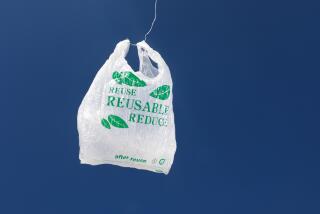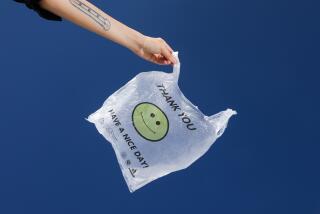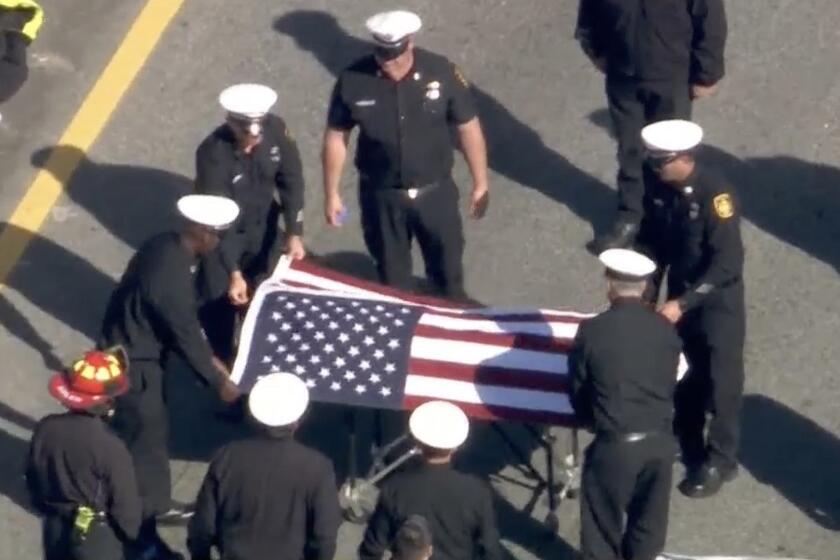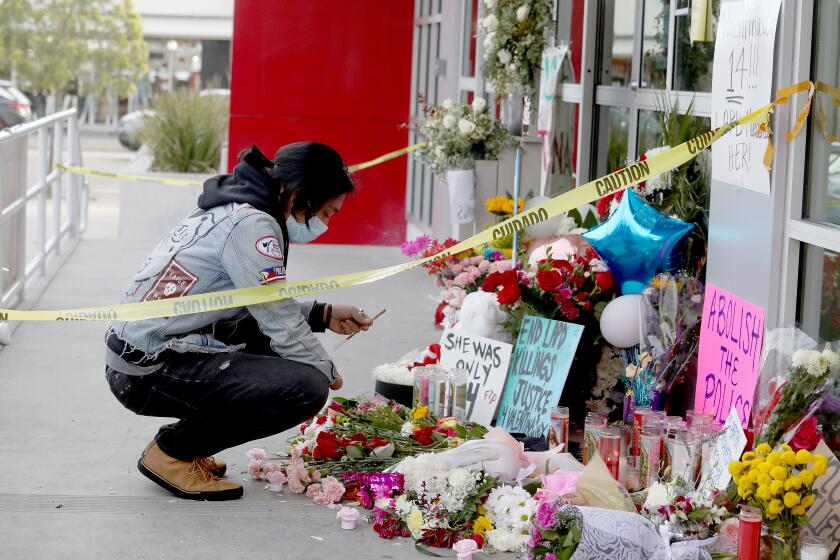L.A. ban on plastic grocery bags takes effect Jan. 1
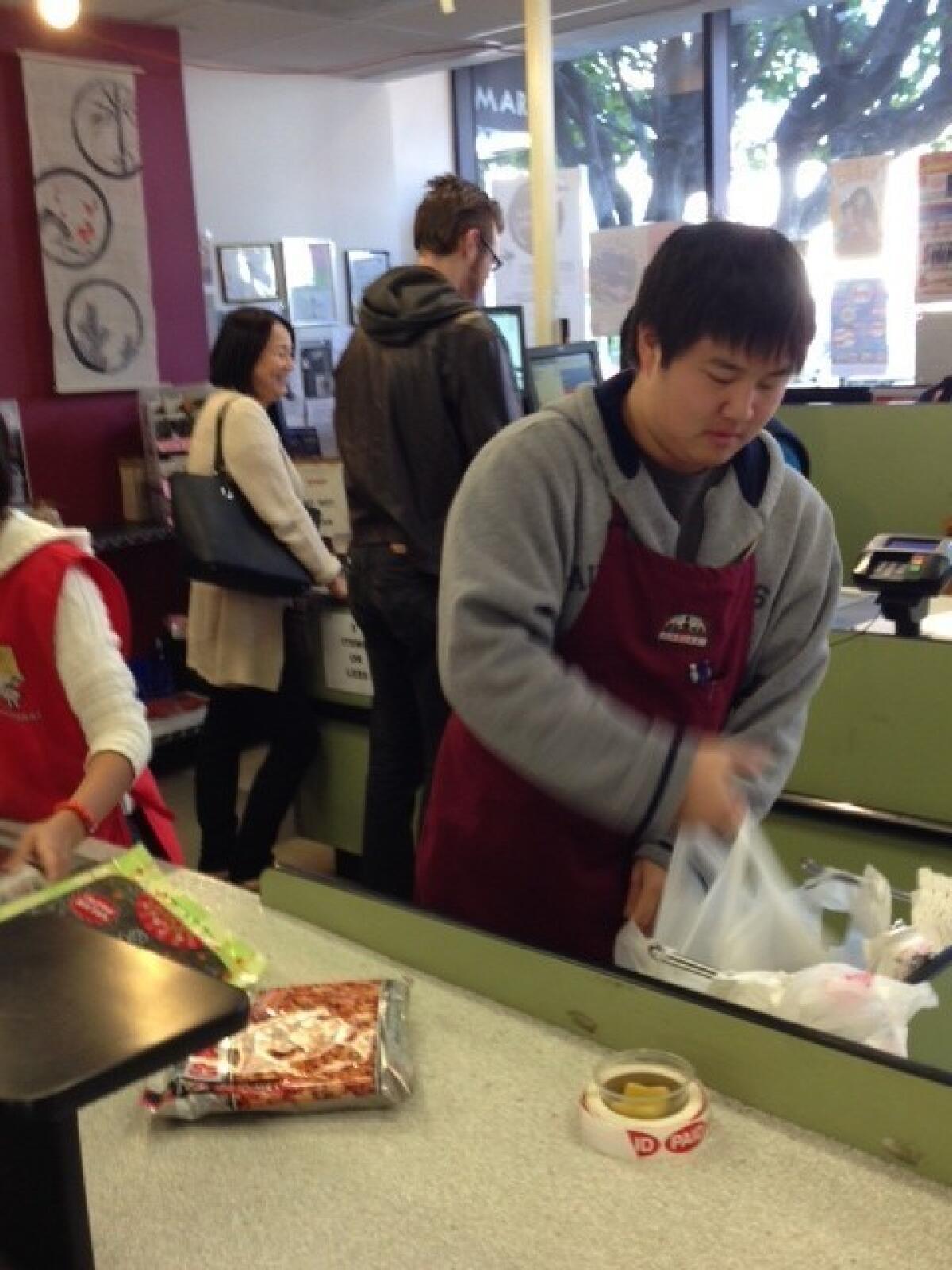
Some Los Angeles grocery store customers will have to adjust to a lifestyle change come Jan. 1, when a ban on plastic bags takes effect.
As of Wednesday, the thin, seemingly ubiquitous carryalls will be illegal for all large grocers to distribute. Small markets must follow suit in July.
Customers will have to bring their own bags, buy reusable ones or purchase paper bags for 10 cents apiece. When L.A. passed its plastic bag ban in June, it became the nation’s largest city to take this step. Also affected are major retailers that sell groceries, such as Wal-Mart and Target.
On Sunday, few customers at Marukai Market in Little Tokyo were using their own cloth or paper bags. And market baggers, including Nicholas Ogino, still were on an all-plastic regimen.
For the moment, the store offers few alternatives. One stand in the middle of the market sells large reusable bags for about $4 apiece.
But the store will be ready come Wednesday, said manager Steve Elliott. It has posted small placards about the new law at every check stand and at the doors in multiple languages. Marukai also plans to offer reusable bags for sale near all checkout registers.
Ideas under consideration include offering lower-price reusables or giving away such bags when customers exceed a minimum purchase level.
Environmental groups have been pushing plastic bag bans both internationally and in the U.S. The African nation of Rwanda became the first country to ban such plastics in 2008, and Haiti followed suit in 2012, extending the prohibition to polystyrene foam cups, plates, trays and other containers. Mexico City and Toronto are among the largest cities abroad to impose bans.
Many of the billions of bags used annually end up in the ocean, where plastic debris kills birds, turtles and other marine life. The thin bags also litter the urban landscape and pose problems at landfills.
In Los Angeles, businesses that fail to comply with the law would face a fine of $100 after the first violation, $200 after the second and $500 after the third. Fines would be imposed for each day the violation continues.
A ban at the state level narrowly failed, but by 2014, at least 30% of California’s population will be covered by laws regulating plastic and paper bags, according to state Sen. Alex Padilla (D-Pacoima), who has tried to take the effort statewide.
At Marukai, Elliott acknowledged that days before the ban, Ogino and other baggers are still tucking all the food into plastic. Ogino is so skilled at managing plastic, it’s hard to get a non-blurry photo of him as he speedily but carefully slides in cans, bottles and prepared-food trays -- double-bagging for extra strength as needed.
“We’re going to have to do a lot of switching,” Elliott said. There’s likely to be a lot of unused plastic. “We’re going to have to talk to the main corporation to see what to do with the leftovers.”
Another concern is a possible increase in shoplifting, with more customers carrying their own durable, spacious bags into stores. At the same time, the store could save money that it used to spend on providing free bags, he said.
But the biggest adjustment will probably be for customers. Elliott estimated that perhaps 20% of the market’s patrons currently bring their own bags.
ALSO:
Los Angeles bus company shut down for safety violations
Funeral for Korean War POW missing 63 years set for Saturday
Authorities search for inmate who escaped from fire camp near Acton
Twitter: @howardblume | howard.blume@latimes.com
More to Read
Start your day right
Sign up for Essential California for news, features and recommendations from the L.A. Times and beyond in your inbox six days a week.
You may occasionally receive promotional content from the Los Angeles Times.
